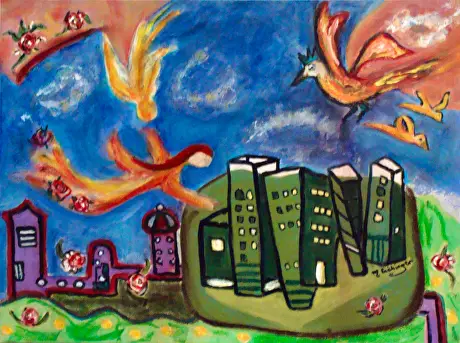Kamala Harris speaks about bringing joy to our lives. Her smile exudes happiness. She runs an upbeat campaign that counts blessings and encourages the nation to repair its mistakes. Her message relies on the hope that citizens can overcome differences and work together to improve society. Whether you are for Harris’s policies or against them, it is refreshing to see a politician who seems genuinely happy. I’m tired of them acting like America’s glass is half-empty when my heart says it’s at least three-quarters full. I am glad to live in the United States for all its troubles.
Edward Gibbon, author of The Decline and Fall of the Roman Empire, argued that imperial Rome under the Antonines in the second century AD was the happiest period in human history. His argument might have some merit if you were a member of the aristocracy. I don’t imagine a member of a slave gang waiting for the arrival of a grain ship from Egypt would be as satisfied. When examining happiness, we need to consider whose and for how long. Is it a fleeting moment or a feeling that keeps growing inside you?
A University of Warwick study reported that 1957 was the happiest year in history. Though there weren’t microwave ovens and fewer than half the people had televisions, and though Google and YouTube weren’t a dream, people were satisfied because they were in sync with their expectations. Being healthy, having job security, and spending time with family and friends were more important to their happiness than amassing physical possessions.
The word gay was in common use before it assumed sexual connotations. I used to feel gay when I went to a party or on a date with the guy I loved. Television and the internet, with non-stop consumer advertisements, initiated an era of dissatisfaction. The ads raise expectations that the purchasing power of money will bring joy. According to studies about happiness, life satisfaction is lower today than it was in 1957. Our thoughts and perceptions have become damaging to our health and well-being.
The rise of individualism and the decline of collectivist ideologies turned happiness into a supreme value. Consumer economies geared up to supply it, undermining a society of subsistence. Yuval Noah Harari’s book Sapiens: A Brief History of Humankind says that because houses are big, ice cream comes in more flavors, and we have better medicine, it doesn’t mean we are happier than those alive during the Stone Age. We certainly live longer and have better painkillers, but the fear of being bored led us to cell phone addiction and increased loneliness among large swaths of the population. There’s something to be said for face-to-face interactions and knowing someone will give you chicken soup when ill.
The World Happiness Report lists the most critical factors for joy as caring, sharing, and social connection. To those, I’d add gratitude. Buddhism says the mind can be trained to be happy. It teaches four truths.
- The Truth of Suffering: We are living in an ongoing state of dissatisfaction. Suffering refers to everything being temporary and impermanent: we will eventually die; we are always craving and desiring things, people, and feelings.
- The Truth of the Origin of Suffering: Suffering/dissatisfaction arises from our actions and our afflictive thoughts and emotions. We should avoid specific actions and attitudes if we don’t want to suffer. For example, if we lie to others, we will live with the stress and paranoia that whoever we lie to may find out the truth.
- The Truth of Cessation: There is a possibility of reaching a state where that dissatisfaction/suffering has ceased. This cessation is not brought about by shutting your mind, turning it off, or making it so dull or sleepy that it can’t function. It comes from facing reality.
- The Truth of the Path: There is a path for us to follow that will bring us to such a state. The path may include meditation, mindfulness, and practicing gratitude.
Rather than being self-centered, joy comes from engaging in activities that improve the environment and human and animal life. Telling the truth about water is why I published my first Rightfully MIne novel, The Water Factor. By sharing what I learned about the corporate takeover of water, I am hopeful you will take action so water returns to be considered a human right, not one that’s commodified.
How happy are you? Do you get irritable, frustrated, and angry? Do circumstances determine whether you’re happy? Are you willing to change? Being filled with joy is a feeling that lasts longer than last night’s party. Practicing gratitude’s worth to me. Thank you for reading and commenting on my newsletters. Your thoughts enrich my life.
_____________________________________________________________________________________________________
Art is always for sale. Searching for Truth is an 18″ by 24″ acrylic painting, available and delivered free in the continental U.S. for $395. For information, contact me at marilynne@eichingerfineart.com
I look forward to your comments.

According to the UN, water is at the center of the climate crisis. THE WATER FACTOR, A RIGHTFULLY MINE NOVEL, is your chance to peer into the near future to a time of water scarcity controls by corporate criminals. The story is a gripping tale of water scarcity and corporate wrongdoing.. It is available in ebook, paperback, and audio formats. It can be purchased on AMAZON, Barnes and Noble, and as an audiobook on Amazon, Audible, and iTunes. Ask your bookstore to order a copy from Ingram. Please leave a review.

